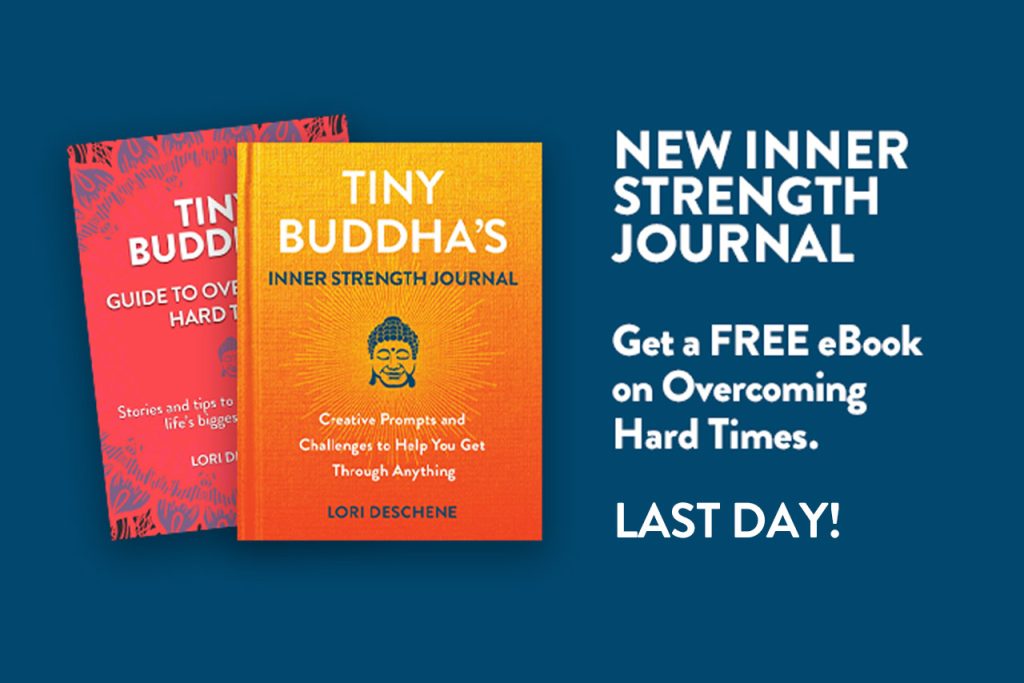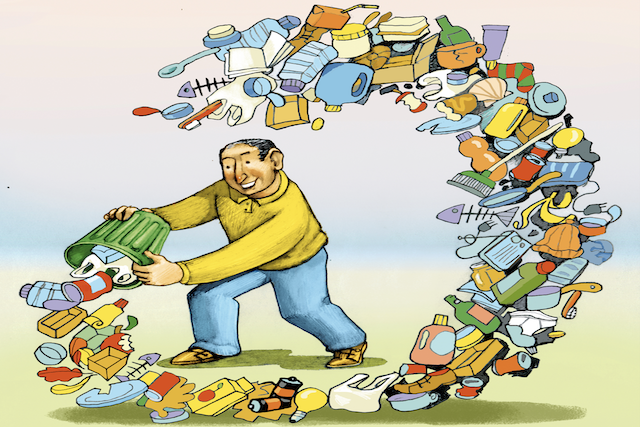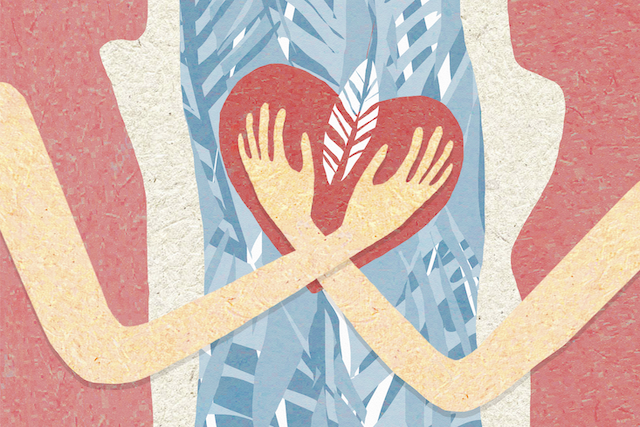
“Care about what other people think and you will always be their prisoner.” ~Lao Tzu
We carefully pick out what we wear to the gym to make sure we look good in the eyes of the other gym goers.
We beat ourselves up after meetings running through everything we said (or didn’t say), worried that coworkers will think we aren’t smart or talented enough.
We post only the best picture out of the twenty-seven selfies we took and add a flattering filter to get the most likes to prove to ourselves that we are pretty and likable.
We live in other people’s heads.
And all it does is make us judge ourselves more harshly. It makes us uncomfortable in our own bodies. It makes us feel apologetic for being ourselves. It makes us live according to our perception of other people’s standards.
It makes us feel inauthentic. Anxious. Judgmental. Not good enough. Not likable enough. Not smart enough. Not pretty enough.
F that sh*t.
The truth is, other people’s opinions of us are none of our business. Their opinions have nothing to do with us and everything to do with them, their past, their judgments, their expectations, their likes, and their dislikes.
I could stand in front of twenty strangers and speak on any topic. Some of them will hate what I’m wearing, some will love it. Some will think I’m a fool, and others will love what I have to say. Some will forget me as soon as they leave, others will remember me for years.
Some will hate me because I remind them of their annoying sister-in-law. Others will feel compassionate toward me because I remind them of their daughter. Some will completely understand what I have to say, and others will misinterpret my words.
Each of them will get the exact same me. I will do my best and be the best I can be in that moment. But their opinions of me will vary. And that has nothing to do with me and everything to do with them.
No matter what I do some people will never like me. No matter what I do some people will always like me. Either way, it has nothing to do with me. And it’s none of my business.
Ok, “that’s all well and good” you may be thinking. “But how do I stop caring what other people think of me?”
1. Know your values.
Knowing your top core values is like having a brighter flashlight to get you through the woods. A duller light may still get you where you need to go, but you’ll stumble more or be led astray.
With a brighter light the decisions you make—left or right, up or down, yes or no—become clearer and easier to make.
For years I had no idea what I truly valued, and I felt lost in life as a result. I never felt confident in my decisions, and I questioned everything I said and did.
Doing core values work on myself has made a huge impact on my life. I came to realize that “compassion” is my top core value. Now when I find myself questioning my career decisions because I’m worried about disappointing my parents (a huge trigger for me), I remind myself that “compassion” also means “self-compassion,” and I’m able to cut myself some slack.
If you value courage and perseverance and you show up at the gym even though you are nervous and have “lame” gym clothes, you don’t have to dwell on what the other gym goers think about you.
If you value inner peace and you need to say “no” to someone who is asking for your time, and your plate is already full to the max, you can do so without feeling like they will judge you for being a selfish person.
If you value authenticity and you share your opinion in a crowd, you can do so with confidence knowing that you are living your values and being yourself.
Know your core values, and which ones you value the most. Your flashlight will be brighter for it.
2. Know to stay in your own business.
Another way to stop caring about what other people think is to understand that there are three types of business in the world. This is a lesson I learned from Byron Katie, and I love it.
The first is God’s business. If the word “God” isn’t to your liking, you can use another word here that works for you, like the universe or “nature.” I think I like “nature” better, so I’ll use that.
The weather is nature’s business. Who dies and who is born is nature’s business. The body and genes you were given are nature’s business. You have no place in nature’s business. You can’t control it.
The second type of business is other people’s business. What they do is their business. What your neighbor thinks of you is his business. What time your coworker comes into work is her business. If the driver in the other car doesn’t go when the light turns green, it’s their business.
The third type of business is your business.
If you get angry with the other driver because you now have to wait at another red light, that’s your business.
If you get irritated because your coworker is late again, that’s your business.
If you are worried about what your neighbor thinks of you that’s your business.
What they think is their business. What you think (and in turn, feel) is your business.
Whose business are you in when you’re worried about what you’re wearing? Whose business are you in when you dwell on how your joke was received at the party?
You only have one business to concern yourself with—yours. What you think and what you do are the only things you can control in life. That’s it.
3. Know that you have full ownership over your feelings.
When we base our feelings on other people’s opinions, we are allowing them to control our lives. We’re basically allowing them to be our puppet master, and when they pull the strings just right, we either feel good or bad.
If someone ignores you, you feel bad. You may think “she made me feel this way by ignoring me.” But the truth is, she has no control over how you feel.
She ignored you and you assigned meaning to that action. To you, that meant that you are not worth her time, or you are not likable enough, smart enough, or cool enough.
Then you felt sad or mad because of the meaning you applied. You had an emotional reaction to your own thought.
When we give ownership of our feelings over to others, we give up control over our emotions. The fact of the matter is, the only person that can hurt your feelings is you.
To change how other people’s actions make you feel, you only need to change a thought. This step sometimes takes a bit of work because our thoughts are usually automatic or even on the unconscious level, so it may take some digging to figure out what thought is causing your emotion.
But once you do, challenge it, question it, or accept it. Your emotions will follow.
4. Know that you are doing your best.
One of the annoying things my mom would say growing up (and she still says) is “You did the best you could with what you had at the time.”
I hated that saying.
I had high standards of myself and I always thought that I could have done better. So when I didn’t meet those expectations my inner bully would come out and beat the crap out of me.
How much of your life have you spent kicking yourself because you thought you said something dumb? Or because you showed up late? Or that you looked weird?
Every time, you did the best you could. Every. Single. Time.
That’s because everything we do has a positive intent. It may not be obvious, but it’s there.
Literally as I’m writing this post sitting in a tea shop in Portland, Maine, another patron went to the counter and asked what types of tea he could blend with his smoky Lapsang Souchong tea (a favorite of mine as well).
He hadn’t asked me, but I chimed in that maybe chaga mushroom would go well because of its earthy flavor. He seemed unimpressed with the unsolicited advice and turned back to the counter.
The old me would have taken that response to heart and felt terrible the rest of the afternoon thinking how this guy must think I’m a dope and annoying for jumping into the conversation uninvited.
But let’s take a look at what I had in that moment:
- I had an urge to try to be helpful and a core value of kindness and compassion
- I had an interest in the conversation
- I had an impression that my feedback might be well received
- I had a desire to connect with a new person on a shared interest
I did the best I could with what I had.
Because I know that, I have no regrets. I also know that his opinion of me is none of my business and I was living in tune with my values trying to be helpful!
Though, I could also see how from another perspective that forcing my way into a conversation and pushing my ideas on someone who did not ask may have been perceived as rude. And rudeness goes against my core value of compassion.
That leads me to the next lesson.
5. Know that everyone makes mistakes.
We live in a culture where we don’t often talk about how we feel. It turns out we all experience the same feelings, and we all make mistakes. Go figure!
Even if you are living in tune with your values, even if you are staying in your own business, even if you are doing your best, you will make mistakes. Without question.
So what? We all do. We all have. Having compassion for yourself comes easier when you understand that everyone has felt that way. Everyone has gone through it.
The only productive thing you can do with your mistakes is to learn from them. Once you figure out the lesson you can take from the experience, rumination is not at all necessary and it’s time to move on.
In the case of tea patron-interjection-debacle, I could have done a better job of reading his body language and noticed that he wanted to connect with the tea sommelier and not a random stranger.
Lesson learned. No self-bullying required.
At my last company I accidentally caused a company-wide upset. A friend and coworker of mine, who had been at the company for a few years, had been asking to get a better parking spot. One came available as someone left the company, but he still was passed over.
He’s such a nice guy, and as my department was full of sarcastics, I thought it would be funny to create a pun-filled petition for him to get the better spot.
I had no idea that it was going to be taken so poorly by some people. It went up the chain of command and looked like our department was full of unappreciative, needy whiners.
And our boss thought it looked like I used my position to coerce people into signing it. He brought the whole department together and painfully and uncomfortably called out the whole terrible situation and demanded it never happen again.
I. Was. MORTIFIED.
He hadn’t named me, but most people knew I created it. I was so embarrassed and ashamed.
But here’s what I did:
- I reminded myself of my values. I value compassion and humor. I thought I was doing a kind but funny act for a friend.
- When I found myself worrying what other people must now think of me, I told myself that if they thought poorly of me (of which I had no evidence) all I could do was to continue to be my best me.
- When flashbacks of that awful meeting came back to mind, flushing my face full of heat and shame, I remembered to take ownership over how I felt and not let the memory of the event or what other people think dictate how I feel now.
- I reminded myself that I did the best I could with what I had at the time. I had a desire to help a friend and an idea I thought was funny and assumed would go over well.
- I realized that I made a mistake. The lesson I learned was to be more considerate of how others may receive my sense of humor. Not everyone finds me as funny as my husband does. I can make better decisions now because of it.
And after a short time the whole incident was forgotten.
Stop worrying about what other people think. It will change your life.
**This post was originally published in 2020.
![]()
About Sandy Woznicki
Sandy is your Resilience Sherpa, guiding big-hearted women leaders up Anxiety Mountain, carrying your pack and cheering you on while you climb your way to become the most Zen-Badass version of yourself from the boardroom to the family room using the Graceful Resilience® Method. Catch her free training on how to Trust your Empowered Action.
version of yourself from the boardroom to the family room using the Graceful Resilience® Method. Catch her free training on how to Trust your Empowered Action.
Get in the conversation! Click here to leave a comment on the site.
The post 5 Powerful Mindset Shifts to Stop Worrying About What Other People Think appeared first on Tiny Buddha.
from Tiny Buddha https://ift.tt/R9uIy8r









